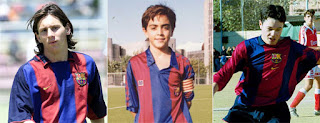After losing out on a second consecutive title to local
rivals Manchester United and having been embarrassed in the FA Cup finals by
lowly Wigan Athletic, the brass at Manchester City has relieved Roberto Mancini
of his responsibilities.
In a statement on the official Manchester City website, the
club defends their decision by saying that, “the Club has failed to achieve any
of its stated targets this year, with the exception of qualification for next
season’s UEFA Champions League.”
This, I can understand. The club has been bankrolled by
Sheikh Mansour, a multi-billionaire who has taken the Roman Abramovich approach
to building a champion and showered City with unlimited resources, allowing
them to compete with Europe’s elite by buying the best talent available and
stockpiling superstars.
Mancini has not performed to the level expected of him with
the resources he has been given. He performed poorly in the coveted Champions League
and has failed to win any silverware this year. With the money he has had
available and the players he decided to buy, he underachieved according to the
board’s evaluation, and they are entirely justified in dismissing him.
However later in their statement, Manchester City also cite the
‘need to develop a holistic approach’.
They don’t describe what they mean by a ‘holistic approach’,
they just kind of throw it in there.
There has been a lot of speculation as to what exactly those
sharp guys in baby blue ties were trying to say. Some think it was a comment on
Mancini’s limited attention to defense and man marking. Others believe it was a
reference to his public disputes and differences with select players.
My interpretation of this from whichever PR staffer who had
his thesaurus handy while he was writing this press release, is that Man City
wants to build a total club, not unlike that of Barcelona. They want a
philosophy; a unique style; a system; a tradition of winning. But therein lies
the problem – a total club takes time and requires patience.
To build a club like Barcelona, Manchester United, Real
Madrid, or Bayern Munich – arguably the supreme of Europe’s footballing kingdom
– a unique and specific philosophy is needed.
In Barcelona, the philosophy is purely about football –
movement, possession, and creativity with one or two touch passing.
At Real Madrid, the philosophy extends beyond the pitch. It
is about sportsmanship, pride, etiquette, and being a gentleman while being
ultimately superior to the opposition.
At Man U the philosophy instilled and cultivated by Sir Alex
Ferguson has been about intensity and competition at all times - in training,
in games, and regardless of opponent; it’s about competing at the highest level
with optimum effectiveness and effort.
These philosophies are not only prevalent in the first team
– they are predominant at every level and in every aspect of the club. They are
the mantras that the youth teams in the academies are nurtured and developed
with. The philosophies of their respected clubs are engrained in youth players
and, the select few who make the leap to professional status, bring years of
being trained with the same ethos and attitude into the starting eleven.
Barcelona starts this process at their training facilities
and academy – the legendary la Masia – at the youngest ages. They develop their
players with their unique system, ideas, and principles. This is why they are
so effective and have been so successful. They have a core of players who have
been trained the same way with the same philosophy. Messi, Iniesta, Xavi,
Pique, Pedro, Busquets, etc. have spent their athletic lives developing under
the same principles. They are very talented cogs in a larger system that has
their replacements waiting at the wings who may not be as fast or have the same
touch, but the ideas, the values, the system of playing the game is exactly the
same.
Manchester City do not have the patience to build this type
of ‘holistic’ club. They have the money, however only a great team with great
players can be bought, not a great club.
A great club is developed organically. It takes time and the
right people who foster unique ideas and an identity that is grown and not
automatically established.
Chelsea is still not a great club. It is a good team with
great players.
Manchester City may want a ‘holistic approach’, but it
doesn’t happen over the summer with 200 million euros in transfer funds.

No comments:
Post a Comment